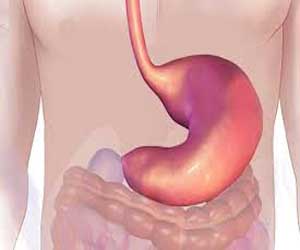- Home
- Editorial
- News
- Practice Guidelines
- Anesthesiology Guidelines
- Cancer Guidelines
- Cardiac Sciences Guidelines
- Critical Care Guidelines
- Dentistry Guidelines
- Dermatology Guidelines
- Diabetes and Endo Guidelines
- Diagnostics Guidelines
- ENT Guidelines
- Featured Practice Guidelines
- Gastroenterology Guidelines
- Geriatrics Guidelines
- Medicine Guidelines
- Nephrology Guidelines
- Neurosciences Guidelines
- Obs and Gynae Guidelines
- Ophthalmology Guidelines
- Orthopaedics Guidelines
- Paediatrics Guidelines
- Psychiatry Guidelines
- Pulmonology Guidelines
- Radiology Guidelines
- Surgery Guidelines
- Urology Guidelines
Scientists synthesize new compound to fight stomach infections

Scientists at the Indian Institute of Technology, Gandhinagar have synthesized a new compound that may help treat stomach infections caused by common bacteria, Helicobacter pylori (H. pylori).
The inhibitor is based on an aromatic chemical compound, indole, and may help in treating H. pylori infection which is a cause for gastritis, peptic ulcers and stomach cancers, according to researchers.
The new inhibitor synthesized by researchers targets a gene known as Inosine-5′-monophosphate dehydrogenase (IMPDH) involved in the nucleotide synthesis of H. pylori. In initial studies, the inhibitor has been found to be better than earlier known benzimidazole-based inhibitor which is poorly metabolized in the liver and is therefore not a potent drug.
“Validating IMPDH as a drug target for H. pylori infection would be our ultimate goal. We also want to make the medicine affordable. We are collaborating with clinicians and animal model experts to take this study further,” said Dr. Sivapriya Kirubakaran, Assistant Professor at IIT-Gandhinagar and leader of research team while speaking to India Science Wire.
It is estimated that about of half of the global population may be infected with H. pylori. While the symptoms of this infection mostly go unnoticed, it is a cause of diseases like gastritis and ulcers. In India, the burden of this infection is almost 80% in rural areas due to poor hygiene and healthcare facilities. Currently, the infection is treated either with clarithromycin-based therapy or by a mix of this therapy and antibiotics.
Besides Dr. Kirubakaran, the study team included Kapil Juvale, Gayathri Purushothaman, Vijay Singh, Althaf Shaik, Srimadhavi Ravi and Vijay Thiruvenkatam. The study has been paper published in journal Scientific Reports.
By Dr Aditi Jain
India Science Wire

Disclaimer: This site is primarily intended for healthcare professionals. Any content/information on this website does not replace the advice of medical and/or health professionals and should not be construed as medical/diagnostic advice/endorsement or prescription. Use of this site is subject to our terms of use, privacy policy, advertisement policy. © 2020 Minerva Medical Treatment Pvt Ltd